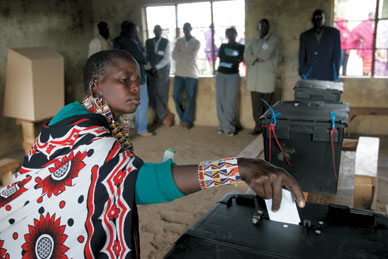Africa: Democratic elections
In 2015, 14 African nations will hold presidential and legislative elections; by the end of 2016, 25 countries will have held elections.
The following article was published in the May-June 2015 NewsNotes.
In 2015, 14 African nations will hold presidential and legislative elections; by the end of 2016, 25 countries will have held elections. From Burkina Faso, Nigeria, Cote d’Ivoire, Togo, Guinea and the Central African Republic (CAR) in the west to Tanzania, South Sudan, Sudan, Somaliland (an autonomous region of Somalia) and Ethiopia in the east, to Zambia and Lesotho in southern Africa, millions of voters will trek to the polls.
The context of each election varies. For nations like Tanzania and Zambia, peaceful democratic transitions have become the norm. Other countries like Sudan and CAR will attempt to hold elections in situations of conflict and regional or ethnic tensions. One – South Sudan – has passed a constitutional amendment bill that extends President Salva Kiir’s mandate in office and the mandate of the current members of parliament for three more years. To the north in the Republic of the Sudan, the time for elections was extended for a full day due to low voter turnout, probably caused by a boycott of the election by opposition parties.
On March 28-29 Nigeria held its fifth quadrennial election since the end of military rule in 1999. Former military dictator Muhammadu Buhari defeated incumbent president Goodluck Jonathan by 2.5 million votes and a mostly peaceful transition of power came about when Jonathan called Buhari to concede the election. This positive development runs counter to the trend in a few central African countries where current presidents are attempting to extend presidential term limits. While some countries – Namibia, Ghana and Mozambique – are strong adherents of term limits, others like Burundi and the Democratic Republic of the Congo (DRC) are proposing ways to extend term limits by finding supposed loopholes in the constitution (Burundi) or by proposing actual changes in the election laws (DRC).
The Catholic bishops of the DRC and many civil society groups opposed such election law amendments and were supported in their efforts by the U.S. Conference of Catholic Bishops. In late 2014 Bishop Richard Pates, chairman of the Committee on International Justice and Peace, wrote to the U.S. State Department urging them to oppose any changes to the constitution by the DRC’s current administration.
In Burundi, the Catholic bishops spoke out and opposed President Pierre Nkurunziza’s interpretation of the constitution as allowing him to run for a third term. In their second pastoral letter ahead of the elections, the bishops stated: “The president elected by the people of Burundi must not exceed the two terms of five years stated in the Constitution.”
According to the International Foundation of Electoral Systems (IFES), Burundi’s elections will be held amid a political climate marked by a sense of polarization that has endured since the local election in 2010, when the ruling National Council for the Defense of Democracy-Forces for the Defense of Democracy (CNDD-FDD) won by a wide margin. The situation has since deteriorated, as political space has shrunk, opposition parties have become marginalized, and the nation’s previously active press and civil society organizations have suffered from increasing government interference in, or prohibitions of, their activities. Tensions are being further exacerbated, however, by President Nkurunziza’s bid to run for a third term, and reports that party youth have received combat training are raising fears that incidents of electoral violence will feature prominently in the 2015 electoral cycle.
According to recent testimony before the U.S. Congress by IFES’s Bill Sweeney, “Nearly 87 percent of sub-Saharan Africa’s eligible population is registered to vote; over 45 million ballots were cast in the region in 2014 alone, and a recent Afrobarometer publication based on more than 51,000 face-to-face interviews in 34 countries reveals that the demand for democracy in Africa exceeds supply.” Sweeney also testified that “in 2015 alone some 311 million people in Africa are registered to vote in upcoming presidential, parliamentary and local government elections and referenda.”
Recent Afrobarometer surveys of 16 African countries reveal some important findings about how African peoples view the elusive concept of democracy. First, the commitment to democratic rule is growing. When asked what kind of government they prefer, most Africans surveyed (71 percent) opt for democracy over other kinds of political regimes. However, only 43 percent of those surveyed think that their country is a democracy. Third, most surveyed believe that democracy is more consolidated in East Africa and least advanced in North Africa. As the election in Nigeria seems to demonstrate, the demand for democracy is greatest in West Africa.
Like other places in the world, elections in Africa can serve many ends. Some can legitimize autocrats like Zimbabwe’s Robert Mugabe. Others can give respectability to rulers who came to power illegally or violently. Still others can and are increasingly becoming peaceful transitions of governance as well as pathways to help countries emerge from situations of internal conflict.
Photo: A Maasai woman votes during Kenya’s 2007 election; photo by Karen Prinsloo.

